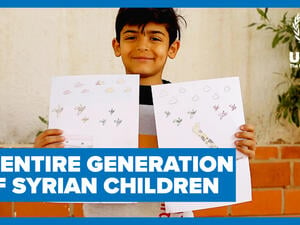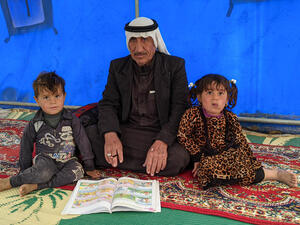Iraq humanitarian effort needs ongoing support
Iraq humanitarian effort needs ongoing support
Although the humanitarian situation in Iraq has been largely out of the spotlight recently, UNHCR remains extremely concerned about meeting the needs of millions of uprooted people both within the country as well as outside.
These concerns were conveyed to donor countries at a UNHCR meeting on Thursday in which the Director of our Bureau for the Middle East and North Africa, Mr. Radhouane Nouicer, said Iraq is currently in a difficult and fragile transition phase that still requires the urgent attention of the international community.
While overall security conditions have improved, they are not yet sustainable enough to have encouraged massive returns of Iraqis. There are still well over 1.5 million Iraqis outside the country - mostly in Syria and Jordan - and another 2 million internally displaced. Although some returns have taken place, many have been neither safe nor sustainable. It is UNHCR's opinion that Iraqis should not be forced back, which would be detrimental to the safety of those concerned and would negatively affect the fragile absorption capacity of the country.
At the same time, the government of Iraq is itself torn between numerous priorities in the political, electoral and national reconciliation spheres. It has many challenges ahead in relation to socio-economic issues and the requirements for the smooth and sustainable return and reintegration of refugees and internally displaced people. The government needs to make further progress in the implementation of its national policy on displacement and return; to take decisions on land allocation and property restitution and compensation; and to launch a major housing and rehabilitation programme that is commensurate with the huge dimensions of the housing problem.
In addition to these internal challenges, UNHCR and its humanitarian partners remain handicapped by a shortage of funds as well as heavy security arrangements that hamper our mobility and our ability to deliver assistance. Nevertheless, we have steadily built up our presence in 14 of Iraq's 17 provinces and many of our partners are doing the same. But these efforts will remain piecemeal if not integrated into a national, government-led framework aimed at addressing the myriad social and economic challenges that must be overcome. On the funding side, UNHCR's $299 million Iraq operation for 2009 is only 48 percent funded and we're not going to be able to implement certain programs if more money is not received soon.
Outside Iraq, asylum countries continue to carry a huge burden and are increasingly concerned over what they fear is gradually becoming a protracted refugee situation. They need and deserve continuing international support.
In our briefing for donors, Mr. Nouicer noted that UNHCR's work is focusing on four areas. First, the need to maintain the "protection space" for uprooted Iraqis, many of whom are still unable or unwilling to return home. Second, the need to do more inside Iraq itself to prepare for returns of internally displaced people and refugees. This includes more support to the government and local authorities in ensuring the adequate reception and sustainable reintegration of returnees. Third, resettlement will remain a major component of the Iraq operation in 2009-10. UNHCR estimates that more than 60,000 Iraqis in neighbouring countries are eligible and in need of resettlement. We have already submitted some 70,000 referrals to resettlement countries, but fewer than 25,000 Iraqis have actually departed. Fourth, UNHCR will continue to focus on other refugee groups inside Iraq, including Palestinians, Iranians, Turks and others who are in precarious conditions.
So we remind the international community that it would be far too risky to reduce support or engagement in the Iraq humanitarian operation at this fragile stage. Iraq has experienced waves of mass displacement over the last 40 years that have resulted in deep social dislocation and complex humanitarian problems. What we are dealing with today is the accumulation of these problems. Bringing stability to such a complex situation is going to take time and requires the collective and continuous engagement of all.








